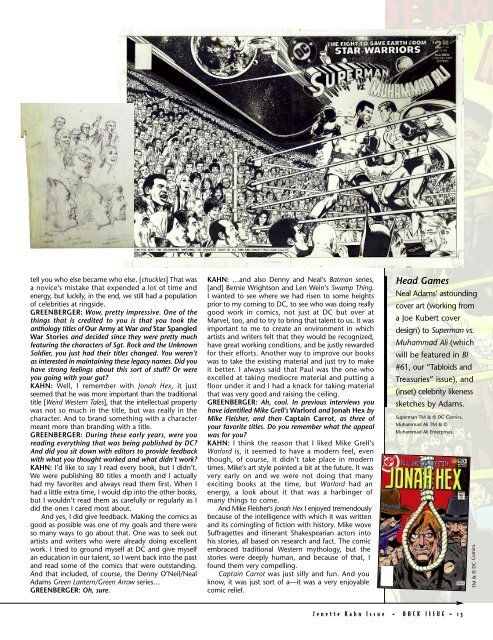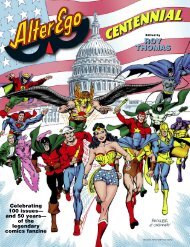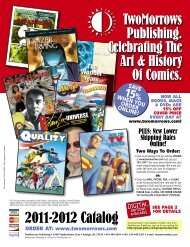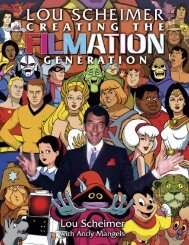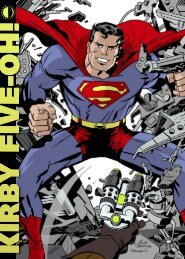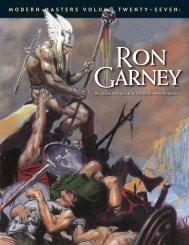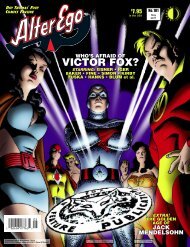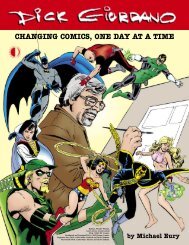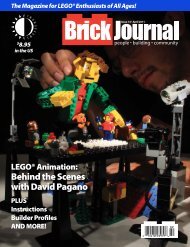JENETTE KAHN - TwoMorrows Publishing Store
JENETTE KAHN - TwoMorrows Publishing Store
JENETTE KAHN - TwoMorrows Publishing Store
Create successful ePaper yourself
Turn your PDF publications into a flip-book with our unique Google optimized e-Paper software.
tell you who else became who else. [chuckles] That was<br />
a novice’s mistake that expended a lot of time and<br />
energy, but luckily, in the end, we still had a population<br />
of celebrities at ringside.<br />
GREENBERGER: Wow, pretty impressive. One of the<br />
things that is credited to you is that you took the<br />
anthology titles of Our Army at War and Star Spangled<br />
War Stories and decided since they were pretty much<br />
featuring the characters of Sgt. Rock and the Unknown<br />
Soldier, you just had their titles changed. You weren’t<br />
as interested in maintaining these legacy names. Did you<br />
have strong feelings about this sort of stuff? Or were<br />
you going with your gut?<br />
<strong>KAHN</strong>: Well, I remember with Jonah Hex, it just<br />
seemed that he was more important than the traditional<br />
title [Weird Western Tales], that the intellectual property<br />
was not so much in the title, but was really in the<br />
character. And to brand something with a character<br />
meant more than branding with a title.<br />
GREENBERGER: During these early years, were you<br />
reading everything that was being published by DC?<br />
And did you sit down with editors to provide feedback<br />
with what you thought worked and what didn’t work?<br />
<strong>KAHN</strong>: I’d like to say I read every book, but I didn’t.<br />
We were publishing 80 titles a month and I actually<br />
had my favorites and always read them first. When I<br />
had a little extra time, I would dip into the other books,<br />
but I wouldn’t read them as carefully or regularly as I<br />
did the ones I cared most about.<br />
And yes, I did give feedback. Making the comics as<br />
good as possible was one of my goals and there were<br />
so many ways to go about that. One was to seek out<br />
artists and writers who were already doing excellent<br />
work. I tried to ground myself at DC and give myself<br />
an education in our talent, so I went back into the past<br />
and read some of the comics that were outstanding.<br />
And that included, of course, the Denny O’Neil/Neal<br />
Adams Green Lantern/Green Arrow series…<br />
GREENBERGER: Oh, sure.<br />
<strong>KAHN</strong>: …and also Denny and Neal’s Batman series,<br />
[and] Bernie Wrightson and Len Wein’s Swamp Thing.<br />
I wanted to see where we had risen to some heights<br />
prior to my coming to DC, to see who was doing really<br />
good work in comics, not just at DC but over at<br />
Marvel, too, and to try to bring that talent to us. It was<br />
important to me to create an environment in which<br />
artists and writers felt that they would be recognized,<br />
have great working conditions, and be justly rewarded<br />
for their efforts. Another way to improve our books<br />
was to take the existing material and just try to make<br />
it better. I always said that Paul was the one who<br />
excelled at taking mediocre material and putting a<br />
floor under it and I had a knack for taking material<br />
that was very good and raising the ceiling.<br />
GREENBERGER: Ah, cool. In previous interviews you<br />
have identified Mike Grell’s Warlord and Jonah Hex by<br />
Mike Fleisher, and then Captain Carrot, as three of<br />
your favorite titles. Do you remember what the appeal<br />
was for you?<br />
<strong>KAHN</strong>: I think the reason that I liked Mike Grell’s<br />
Warlord is, it seemed to have a modern feel, even<br />
though, of course, it didn’t take place in modern<br />
times. Mike’s art style pointed a bit at the future. It was<br />
very early on and we were not doing that many<br />
exciting books at the time, but Warlord had an<br />
energy, a look about it that was a harbinger of<br />
many things to come.<br />
And Mike Fleisher’s Jonah Hex I enjoyed tremendously<br />
because of the intelligence with which it was written<br />
and its comingling of fiction with history. Mike wove<br />
Suffragettes and itinerant Shakespearian actors into<br />
his stories, all based on research and fact. The comic<br />
embraced traditional Western mythology, but the<br />
stories were deeply human, and because of that, I<br />
found them very compelling.<br />
Captain Carrot was just silly and fun. And you<br />
know, it was just sort of a—it was a very enjoyable<br />
comic relief.<br />
Head Games<br />
Neal Adams’ astounding<br />
cover art (working from<br />
a Joe Kubert cover<br />
design) to Superman vs.<br />
Muhammad Ali (which<br />
will be featured in BI<br />
#61, our “Tabloids and<br />
Treasuries” issue), and<br />
(inset) celebrity likeness<br />
sketches by Adams.<br />
Superman TM & © DC Comics.<br />
Muhammad Ali TM & ©<br />
Muhammad Ali Enterprises.<br />
TM & © DC Comics.<br />
J e n e t t e K a h n I s s u e • B A C K I S S U E • 1 5


